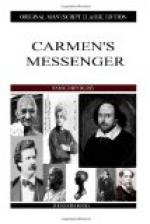When they came out of the mist, however, he began to find the silence daunting. On the hills one could hear the grouse and plover crying and the murmur of running water, but an oppressive quietness brooded over the flow. Nor could he see much except rushes, treacherous moss, and dully-glimmering pools. By and by, however, a dark mass loomed through the haze and Pete stopped and looked back.
For a moment or two Foster heard nothing, and then there was a splash and a noise, as if somebody was floundering through the rushes. The sounds were nearer than he had thought possible, and he glanced at his companion.
“They’re no’ traiveling badly and they’ve keepit the track so far,” Pete remarked. “Maybe ye wouldn’a care to try their speed for the next two or three miles?”
“Certainly not,” said Foster; “that is, if there’s another way.”
“Weel,” said Pete, “they’re surely nearer than I thought, and might see where we crossed the burn. There’s nought for’t but the shieling on the knowe.”
He went on, and the dark mass ahead grew into a rocky mound covered with small trees. They were birches, because Foster saw their drooping, lacelike twigs above the low mist; and the indistinct object among their stems was the shieling. It was obvious that the hut would catch the eyes of the men behind if they came close enough, and he stopped where the ground rose.
“We’ll no’ gang in yet,” said Pete.
They skirted the mound, which was larger than Foster thought and broken by out-cropping rock, and when a thick screen of the birches rose between them and the building, crept into a nook among the stones. Foster imagined that the others might search for half the night without finding them unless they were lucky. Then Pete remarked in a meaning tone: “There’s just the twa, and I hae a good stick.”
Foster smiled. He was tired, wet, and savage, and would have liked to confront Graham and settle their differences by force; but the matter could not be treated in this primitive way. He could not shoot the men, and would be no better off if he overpowered and threw them in the bog. They would know where he was and would follow him as close as was safe, while he wanted to shake them off and make them uncertain whether they were on his track or not. Besides, his antagonists might avoid a conflict.
“The thing’s too complicated to be straightened out by knocking somebody down,” he said. “But I’m glad I’m not here alone.”
In the meantime, the others were getting nearer, for Foster heard them splash through the wet moss and stumble among the rushy grass. They were walking fast, which indicated that they thought themselves some distance behind the fugitives; but stopped when they saw the birches, and then came on again cautiously. Foster could not see them until their blurred figures appeared among the trees. So long as he kept still there was little chance of his being found.




